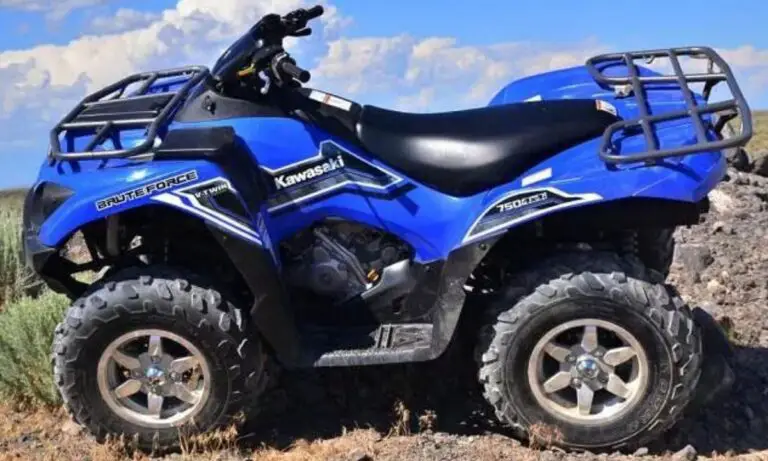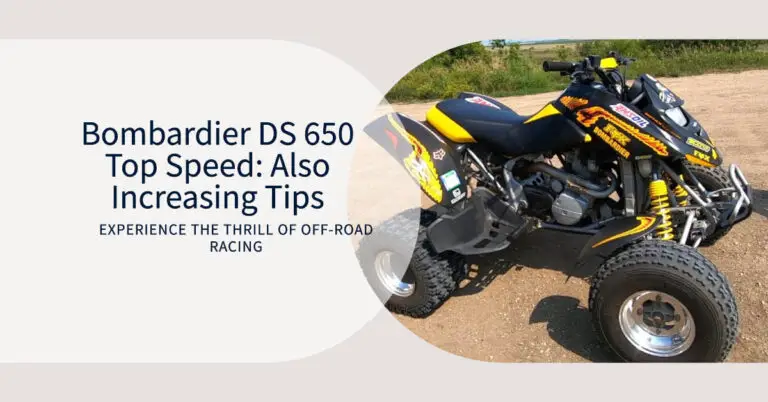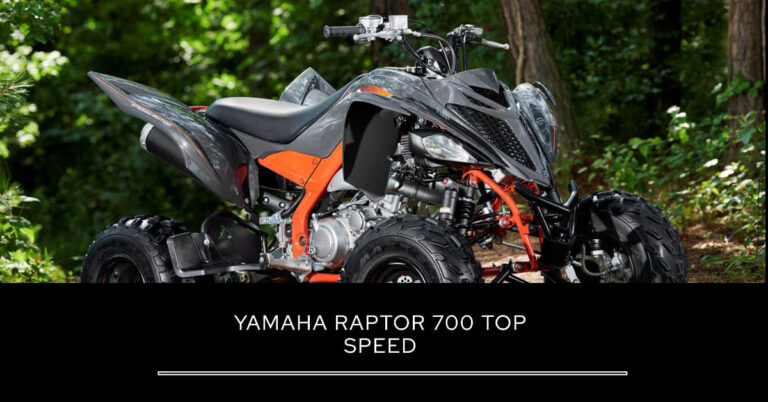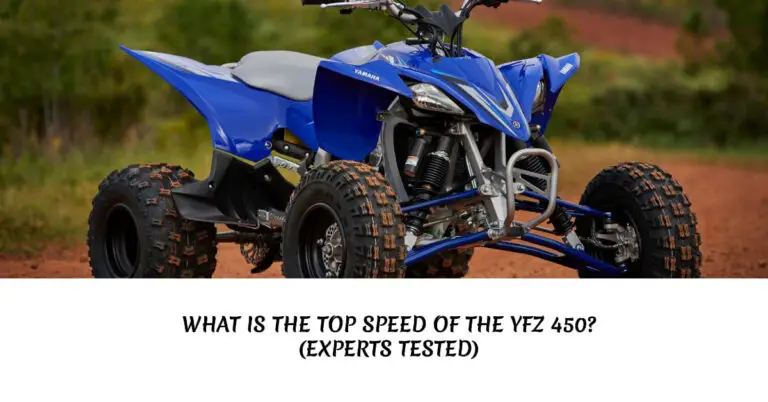Kawasaki KFX 400 Top Speed (5 Tips To Make More Faster)

Are you curious what the Kawasaki KFX 400’s top speed and acceleration capabilities are? As one of Kawasaki’s most popular sport ATVs, the KFX 400 is known for its incredible speed and throttle response.
In this in-depth article, we’ll cover everything you need to know about the Kawasaki KFX 400’s top speed, 0-60 mph time, horsepower, torque, and other key performance specs. We’ll also overview common mods and upgrades to boost the KFX 400’s speed and acceleration even further.
Table of Contents
Introduction to the Kawasaki KFX 400 Sport ATV
The Kawasaki KFX 400 first debuted in 2006 as part of the KFX performance ATV lineup. Kawasaki designed it as a mid-sized sport quad offering aggressive styling, responsive handling and most importantly – incredible power from its 399cc engine.
Throughout its production run until 2009, the KFX 400 established itself as one of the fastest racing quads thanks to its strong acceleration, high top speed, and tune-able engine. Its popularity among ATV enthusiasts has remained strong even years after being discontinued.
So how fast does this beast of a sport ATV really go? Let’s take a closer look at the Kawasaki KFX 400’s performance specs and capabilities.
KFX 400 Top Speed from the Factory
One of the most common questions asked about the KFX 400 is: what is the top speed?
The stock KFX 400 from the factory has an impressive top speed of around 72 mph (116 km/h) once the engine is fully broken in. For a 400cc class sport ATV, hitting speeds over 70 mph is really moving.
To reach the max top speed you’ll need long straight stretches of dirt or gravel trails since the KFX 400 takes some distance to fully wind up in the higher RPMs. Always make sure you are riding safely for the conditions when running at top speed.
While 72 mph is the published top speed, some owners have reported hitting slightly faster in the 75 mph range when completely stock. With basic bolt-on performance modifications, the KFX 400’s top speed can extend into approximately 85 mph range.
Detailed Kawasaki KFX 400 Specs and Performance
To better understand where the Kawasaki KFX 400’s speed and acceleration abilities come from, let’s take a closer look at the key engine specs and horsepower numbers:
KFX 400 Engine
The KFX 400 runs a 399cc single-cylinder 4-stroke engine, featuring liquid cooling and an advanced DOHC design with 4-valves. This provides significant increases in both horsepower and torque compared to a standard SOHC valve train.
Additional engine features include:
- 85 mm bore x 66 mm stroke
- 11.0:1 compression ratio
- 33 mm CVK Keihin carburetor
- Digital DC-CDI ignition
- Electric start
With that stout engine packed into a relatively lightweight chassis, the KFX 400 has an excellent power-to-weight ratio for a mid-sized ATV.
Horsepower and Torque
When first launched, the KFX 400 was rated at 32 horsepower. However, Kawasaki later updated that to 33 hp at 7,000 RPM once the engine was dialed in.
Along with the horsepower, the KFX 400 churns out 25 ft-lbs of torque at 6,000 RPM. That’s a useful spread of power across the RPM range, providing strong acceleration from a stop as well as at speed.
Here are the key horsepower and torque figures:
Kawasaki KFX 400 Power and Performance
- Horsepower: 33 hp at 7,000 RPM
- Torque: 25 ft-lb at 6,000 RPM
This level of power is very impressive for a 400cc class ATV, especially when combined with the KFX 400’s lightweight. The power-to-weight ratio is better than many 500cc and some 700cc ATVs.
Kawasaki KFX 400 0-60 MPH Time
In addition to an impressive top speed, the Kawasaki KFX 400 can hit 60 mph from a standstill very quickly. This 0-60 mph acceleration is aided by the engine’s strong low-end torque.
The stock KFX 400 can reach 60 mph in approximately 5.5 seconds when the engine is uncorked and broken in. That’s about on par with many sport bikes and hot hatches.
With some simple bolt-on engine modifications which we’ll detail further below, the 0-60 time can be reduced to around 5.0 seconds flat.
The fast throttle response and torque lets the KFX 400 sprint off the line and blast down dirt roads faster than many bigger bore ATVs. This makes the KFX 400 super fun for trail riding, the dunes, and short course racing.
Kawasaki KFX 400 Chassis and Transmission
Complementing that high-output 399cc engine is a specialized chassis and transmission built for sport riding:
Chassis
- Double A-arm front suspension with preload adjustable shocks provides 8.1″ of travel
- Uni-Trak rear suspension with preload and rebound adjustable shocks, 8.1″ travel
- Low center of gravity
- Weight is 393 pounds dry
Drivetrain
- Manual, clutchless 5-speed transmission
- O-ring sealed chain drive
- Sealed rear wet brake
The chassis itself is compact but very rugged. The low center of gravity and optimized suspension give the KFX precise cornering abilities and stability at high speeds.
Some downsides to the chassis include the lack of front suspension adjustability from the factory and no reverse gear. The curb weight is also on the heavier side for a 400cc sport quad.
Kawasaki KFX 400 Fuel Range
One limitation of the KFX 400 that affects how you can use its performance is the relatively small fuel tank. It only holds 2.6 gallons (9.8 liters) of gas.
Combined with a thirsty, high-revving engine, you’ll be stopping for fuel fairly often on long rides. Expect a range of only 30-50 miles depending on your riding style before needing to refuel.
Definitely keep the low fuel range in mind if you plan on riding the KFX 400 for high speed trail riding or dune sessions. Bring extra gas or scout out where you can refuel nearby.
Pros and Cons of the Kawasaki KFX 400
To summarize the stand-out attributes of the KFX 400, here are the main pros and cons:
Pros
- Powerful 399cc liquid-cooled DOHC engine
- 33 hp provides a 72 mph top speed
- Strong acceleration and 5.5 second 0-60 time
- Crisp 5-speed manual transmission
- Lightweight chassis and sporty ergonomics
- Tunable engine with huge aftermarket support
- Double A-arm suspension soaks up rough terrain
Cons
- Heavy curb weight of 393 pounds reduces agility
- No reverse gear can make maneuvering difficult
- Small 2.6 gallon fuel tank limits range
- Suspension lacks high-end adjustability
- Discontinued in 2009 so harder to find used
Overall the Kawasaki KFX 400 brings an impressive balance of power, speed, and nimble handling to the 400cc sport ATV class. The high-revving engine delivers loads of fun when you twist the throttle.
One of the best attributes of the Kawasaki KFX 400 is its engine’s huge potential for tuning and modifications.
With the right performance upgrades, you can boost the top speed to over 80 mph. Acceleration and throttle response also see nice gains.
How To Increase The KFX 400’s Speed And Acceleration?
Here are the most common and effective ways to increase KFX 400 speed:
- Exhaust System: An aftermarket slip-on or full system exhaust like the FMF Powercore 4 provides huge gains in power while reducing weight. You need a fuel controller with a new exhaust.
- Air Filter: A free-flowing performance air filter like the K&N filter kit allows more air into the engine.
- Fuel Controller: An electronic fuel programmer or carb jet kit optimizes fueling to match intake and exhaust changes. The Dynojet Power Vision is a top option.
- Engine Porting: Polishing and modifying the engine cylinders and ports can significantly increase hp and torque across the RPM range.
- Camshaft: Upgrading to performance cams optimized for racing lets the engine rev higher and breathe better.
With just bolt-on modifications like the exhaust, air filter, and fuel tuner, you can expect to increase the KFX 400’s horsepower by 15% or more. That translates to 3-5 mph additional top speed along with much improved throttle response.
Going further by porting the engine, adding high compression pistons, and installing hot cams can take the KFX over 40 hp and 80+ mph. But this requires advanced technical skills.
Just remember to upgrade components together that complement each other. Don’t just throw on an exhaust without adjusting fuel delivery as well. Work with experienced tuners to build your engine right.
Tips For Riding A Kawasaki KFX 400 At Top Speed
Once you’ve built up your KFX 400 to achieve its maximum speed potential, here are some helpful tips for riding it safely:
- Start slow and work your way up. Don’t go 0 to 80 mph immediately until you are very comfortable with the quad’s handling.
- Get used to using the brakes. The KFX can hit high speeds quickly so practice slowing down in a controlled manner.
- Know the terrain. Only run wide open throttle in areas you know are flat and smooth, without obstacles.
- Sit forward ready to handle bumps. Keep your weight centered and be prepared to react.
- Use goggles and keep your face shield down. Wind blast at 80 mph can hurt if something flies into your eyes.
- Check bolts and spokes often. The engine and wheels take more stress at high speeds.
- Bring tools and spare parts. Flats, mechanical breakdowns, and crashes happen more at high speeds. While the KFX 400 is capable of blazing speed, it takes proper care and practice to handle it safely. Work on throttle control, body positioning, and bike setup. Then you can enjoy hitting 80 mph in controlled bursts!
Specifications Of The Kawasaki KFX 400
To see all of the key specs and features of the KFX 400 at a glance, here is a specifications table:
| Specifications | Details |
|---|---|
| Engine | 399cc, 4-stroke single cylinder, DOHC, liquid-cooled |
| Bore x stroke | 85 mm x 66 mm |
| Compression ratio | 11.0:1 |
| Valvetrain | 4 valves per cylinder |
| Fueling | 33 mm CVK Keihin carburetor |
| Ignition | Digital DC-CDI |
| Starting | Electric start |
| Transmission | 5-speed, manual |
| Final drive | O-ring sealed chain |
| Fuel capacity | 2.6 gallons |
| Wheelbase | 45.7 in |
| Seat height | 31.5 in |
| Ground clearance | 4.7 in |
| Front suspension | Double A-arm, 8.1 in. travel |
| Rear suspension | Uni-Trak, 8.1 in. travel |
| Front brake | Dual hydraulic disc |
| Rear brake | Sealed wet brake |
| Front tires | 20 x 7-10” |
| Rear tires | 18 x 10.5-8” |
| Dry weight | 393 lb |
| Overall length | 71.3 in |
| Overall width | 41.5 in |
| Wheelbase | 45.7 in |
This covers all of the important dimensions, capacities, chassis components and powertrain details of the stock KFX 400. It provides a complete overview of the quad’s specifications right from the factory.
Conclusion
Even though the Kawasaki KFX 400 has been out of production for over 10 years now, it still delivers performance that holds up against modern 400cc and some 450cc sport quads.
With the KFX 400’s impressive top speed of 72 mph out of the crate, and potential for over 80 mph with engine tuning, it offers incredible speed capabilities. The strong low-end torque also gives it great acceleration, with 0-60 mph possible in just over 5 seconds.
While the lack of features like independent rear suspension and fuel injection show the KFX 400’s age, its 399cc engine still shines thanks to the liquid cooling, DOHC design and tunability. With a huge aftermarket industry supporting it, the KFX engine can be modified to produce well over 40 hp.
For experienced riders looking for aggressive performance on a budget, the Kawasaki KFX 400 remains a top choice. Just be prepared for the relatively short fuel range and higher curb weight.
So if you get a chance to rip around on a properly set up KFX 400, hold onto the handlebars tight as you blast from 0 to over 80 mph in a blur!







